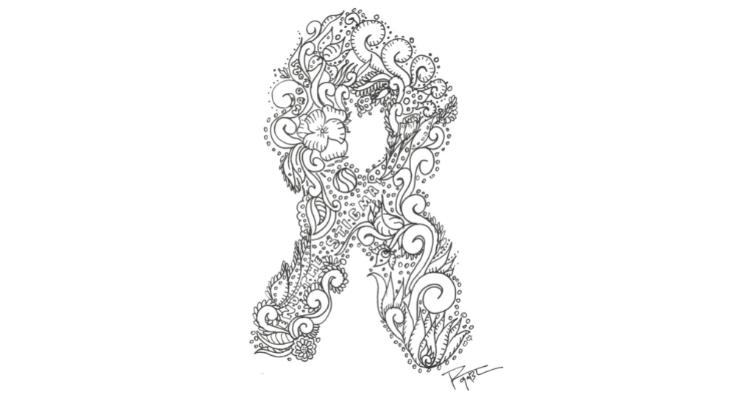Dismantling Shame Around HIV/AIDS with Love — and Art
December 1, 2021

Artist Statement:
Every year as we get close to World AIDS Day, I often have mixed feelings about this day. This day creates an annual international recognition of those we have lost to HIV/AIDS related illness, visibility for medical breakthroughs and honors people living and thriving with HIV/AIDS across the world. It is an important day indeed yet, I still don’t see enough communities talking about some of the deeper roots of how HIV/AIDS impacts our communities, barriers to access and community, how we demonstrate resilience and what we can do to destigmatize and disentangle the virus from people living with it.
In my work with college students, I have had too many students come to me in tears, afraid that they are the only one who is HIV positive and worried about dating, quality of life, faith and spiritual searching and personal/professional aspirations. The stigma felt heavier than the virus for many of these students. This art piece is in honor of all those that choose to love themselves and work to collectively dismantle our culture of shame around HIV/AIDS, especially in higher education and religious/spiritual communities.
This piece features a ribbon made of flowers in bloom (including roses, lotuses, and lilies and others) which have important spiritual significance in various religious traditions around the world. They surround the words “End the Stigma” and urge us to recognize the source of where our work is needed – in our faith communities. Flowers cannot grow in tainted soil. Healthy and inclusive approaches to destigmatizing HIV/AIDS and elevating people living with HIV/AIDS cannot happen without deeper work to address other -isms in our world. Destigmatizing HIV/AIDS requires us to have honest conversations about who matters in our world, and addressing ways in which HIV/AIDS, COVID-19, and other pandemics highlight structural inequities. We cannot end stigma of HIV/AIDS until we address homophobia, transphobia, anti-Blackness, ethnocentrism and other frameworks that have shaped our current strategies to fighting HIV/AIDS, especially in the United States. Further, we need to make space for people living with HIV/AIDS (PLWH) within our spiritual traditions as leaders and guides to inform our path forward.
Ending the Stigma also requires us to decenter Christian views of “hate the sin, love the sinner” and complicating our current understanding of various religious traditions on how they can make space for supporting people living with HIV/AIDS, enhancing knowledge of HIV/AIDS history, immunology and actively supporting interfaith collaborations to share resources and insights.
I hope you take time to color this piece however you like and as you do so, reflect on strategies for creating collective impact towards destigmatizing HIV/AIDS and working towards finding a cure.
Raja Gopal Bhattar, Ph.D., (they/them/theirs) hails from a long lineage of Hindu spiritual leaders from the Srivaishnava tradition. They are a higher education leader, advocate, and consultant. Bhattar was a 2020 Interfaith America Racial Equity Fellow.
Share
Related Articles
Racial Equity
American Civic Life
Racial Equity



